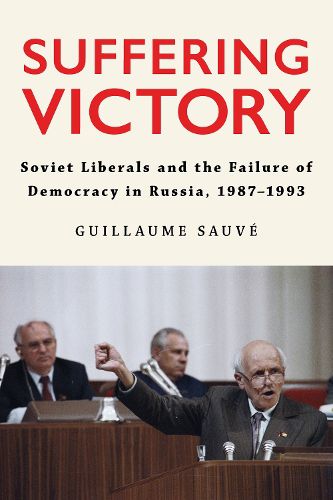Readings Newsletter
Become a Readings Member to make your shopping experience even easier.
Sign in or sign up for free!
You’re not far away from qualifying for FREE standard shipping within Australia
You’ve qualified for FREE standard shipping within Australia
The cart is loading…






Suffering Victory recounts the commitment of Soviet liberal intellectuals to democratic transition during the effervescent period of perestroika and in the first years of post-Soviet Russia to the rise of Boris Yeltsin and the dissolution of the USSR. Guillaume Sauve argues that late Soviet liberalism was mainly nourished by the legacy of humanistic socialism, combining Enlightenment ideals and Romantic aspirations, and concludes that the distinguishing feature is its assumed moralism.
After encouraging the concentration of power in the hands of the Russian president and an enlightened elite, liberal intellectuals undermined their own democratic project and were pushed aside from decision-making, while being rejected by most of the population for having supported a course of reforms that did not fulfill its promises. As Suffering Victory shows, the success of Russia's liberal intellectuals against the Communist Party came at the price of a decline deeper and more lasting than in most post-communist countries. Following the full-scale invasion of Ukraine in February 2022, the fate of late Soviet liberals sheds crucial light on the prospects of liberal reforms in Russia today.
$9.00 standard shipping within Australia
FREE standard shipping within Australia for orders over $100.00
Express & International shipping calculated at checkout
Suffering Victory recounts the commitment of Soviet liberal intellectuals to democratic transition during the effervescent period of perestroika and in the first years of post-Soviet Russia to the rise of Boris Yeltsin and the dissolution of the USSR. Guillaume Sauve argues that late Soviet liberalism was mainly nourished by the legacy of humanistic socialism, combining Enlightenment ideals and Romantic aspirations, and concludes that the distinguishing feature is its assumed moralism.
After encouraging the concentration of power in the hands of the Russian president and an enlightened elite, liberal intellectuals undermined their own democratic project and were pushed aside from decision-making, while being rejected by most of the population for having supported a course of reforms that did not fulfill its promises. As Suffering Victory shows, the success of Russia's liberal intellectuals against the Communist Party came at the price of a decline deeper and more lasting than in most post-communist countries. Following the full-scale invasion of Ukraine in February 2022, the fate of late Soviet liberals sheds crucial light on the prospects of liberal reforms in Russia today.